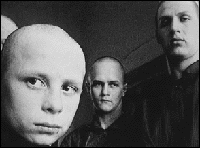|
|
| Director, Script: Taras Popov, Vladimir Tulkin Photography: Taras Popov Editing: Asia Baigozhina Music: Alice Cooper Sound: Andley Vlaznev Producer: Galina Kuzembayeva, Taras Popov Production Company: GALA TV Source : Films Transit International Inc 402 Notre-Dame East, Montreal, QC H2Y 1CB CANADA Phone: 1-514-844-3358 / Fax: 1-514-844-7298 KAZAKHSTAN / 1996 / Russian / Color / Video / 53 min |
Born in 1957 in Karaganda, Kazakhstan. After studies in pediatrical medicine, worked as a psychiatrist in medico-psychological laboratory of Ministry of Internal Affairs. In 1984-95, worked as psychiatrist for teenagers in young adults prison camp in Almaty. In 1993, started to use videocamera to investigate teenagers' psychological processes while they are in isolation. This videomaterial became the foundation for Experimentum Crucis.
Born in 1955 in Semipalatinsk, Kazakhstan. In 1982, he graduated from the Kazakh State University, physico-mathematical faculty. In 1987, he graduated from the Leningrad State Institute of Theatre, Music and Cinema, TV Producers' department. Since then he worked at the Kazakhfilm Studio in various capacities, including screenwriter and stage manager for many internationally acclaimed works produced in Kazakhstan. |
 |
|
| Filmmaker Taras Popov worked as a psychiatrist at a prison for boys for over 10 years before taking a video camera in hand to shoot the stories of children who considered him a friend. This footage became the basis for this documentary. Revealing the harsh struggle for survival among the inmates in this miniature facsimile of outside society, the film portrays the grim reality of life on the bottom of society. | |
|
|
|
|
Director's Statement The subject matter of the film and its portrayal of a universal and timeless dilemma, have led to heated debate among professionals and critics in the film world. Every showing inspires powerful feelings of anger--reflecting some of the anger in the film; these feelings may result in catharsis. The experiences of these young offenders and their eyes and expressions correspond with those of the Holy Martyrs; the religious references serve to remind us that these boys are caught in a historical process; when societies disintegrate it is the innocent and the weak who suffer. These boys are victims of the break up of society in the same way as the Bible tells us, the poor and defenseless were crushed in the collapse of the Roman Empire. Even the childhood of Jesus Christ may have contained some of the pain and desperation of these children. But in their case, the only hope they have of a fair hearing of justice, is through this film. |
|

